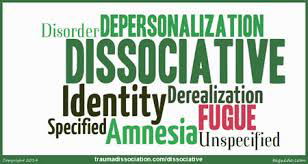Dissociative Disorders: Understanding, Preventing, and Controlling with Lifestyle Changes and Medications
Introduction:
Dissociative disorders are a group of psychological conditions characterized by disruptions in a person's sense of identity, memory, consciousness, or perception of the environment. These disorders can significantly impair an individual's functioning and quality of life. In this article, we will explore the types, causes, symptoms, and factors responsible for dissociative disorders, as well as discuss ways to prevent and control them through lifestyle changes and medications.
Types of Dissociative Disorders:
There are several categories of dissociative disorders, which encompass various conditions characterized by disruptions or disturbances in a person's consciousness, memory, identity, or perception. These disorders can include:
a) Dissociative Identity Disorder (DID):
This disorder was previously known as multiple personality disorder. It involves the presence of two or more distinct personality states or identities within one individual.
b) Dissociative Amnesia:
This form of dissociative disorder manifests as the incapacitation to recollect significant personal details, frequently associated with distressing or overwhelming experiences.
c)Depersonalization-Derealization Disorder:
This disorder is characterized by persistent or recurrent experiences of feeling detached from one's body (depersonalization) or feeling that the external world is unreal or unfamiliar (derealization).
Causes and Factors Responsible:
The causes of dissociative disorders are complex and multifaceted. While the exact mechanisms are not fully understood, the following factors are believed to contribute to their development:
a) Trauma:
Experiencing profound trauma, whether physical, sexual, or emotional, during childhood or adulthood, greatly increases the likelihood of developing dissociative disorders. Traumatic events overwhelm a person's capacity to cope, leading to dissociative symptoms as a defense mechanism.
b) Coping Mechanism:
Dissociation can serve as a coping mechanism to deal with overwhelming stress or traumatic experiences. It allows individuals to detach from the distressing reality and create an inner world where they feel safe.
c) Neurobiological Factors:
Certain brain regions involved in memory and emotion regulation, such as the hippocampus and amygdala, may function differently in individuals with dissociative disorders. Neurochemical imbalances, particularly in neurotransmitters like serotonin and dopamine, may also contribute to these disorders.
Symptoms of Dissociative Disorders:
The symptoms of dissociative disorders vary depending on the specific type. However, some common symptoms include:
a) Memory disruptions or gaps: Individuals may experience memory loss or gaps in their recollection of important personal information or traumatic events.
b) Identity confusion:
People with dissociative identity disorder may have a fragmented sense of self, with different identities or personalities that may emerge and take control of their behavior.
c) Emotional and psychological distress:
Individuals with dissociative disorders often experience symptoms of anxiety, depression, and mood swings. They may also have difficulties with emotional regulation.
d) Depersonalization and derealization:
Feelings of detachment from oneself or the surrounding environment are common symptoms in depersonalization-derealization disorder.
Prevention and Control:
While dissociative disorders are complex and challenging to prevent entirely, there are certain strategies that individuals can adopt to reduce their risk or manage their symptoms effectively. These strategies include:
a) Psychotherapy:
Psychotherapy, especially approaches like cognitive-behavioral therapy (CBT) and trauma-focused therapy, can be highly beneficial in treating dissociative disorders. These therapeutic approaches aim to help individuals process and integrate traumatic memories, develop coping mechanisms, and build resilience.
b) Medications:
Medications such as antidepressants, anti-anxiety drugs, and mood stabilizers may be prescribed by a qualified healthcare professional to manage associated symptoms of dissociative disorders. However, medication alone is not considered a standalone treatment and is often used in conjunction with psychotherapy.
c) Stress management:
Learning and practicing stress management techniques, such as mindfulness meditation, deep breathing exercises, and relaxation techniques, can help individuals reduce stress levels and prevent dissociative episodes triggered by overwhelming stress.
d) Establishing a support system:
Building a strong support system consisting of understanding and empathetic friends, family members, or support groups can provide emotional support and validation, which is essential for individuals with dissociative disorders.
e)Healthy lifestyle choices:
Engaging in regular physical exercise, maintaining a balanced diet, getting enough sleep, and avoiding substance abuse can contribute to overall mental well-being and potentially reduce the severity of dissociative symptoms.
Conclusion:
Dissociative disorders are complex psychological conditions that can significantly impact an individual's life. Understanding the different types, causes, and symptoms of dissociative disorders is crucial in facilitating prevention and control. By adopting a combination of psychotherapy, medication, stress management techniques, building a support system, and maintaining a healthy lifestyle, individuals can effectively manage dissociative disorders and improve their quality of life. It is essential to seek professional help from mental health experts who can provide a personalized treatment plan and support throughout the recovery process.
Note: This article is for informational purposes only and should not replace any professional medical advice.










0 Comments